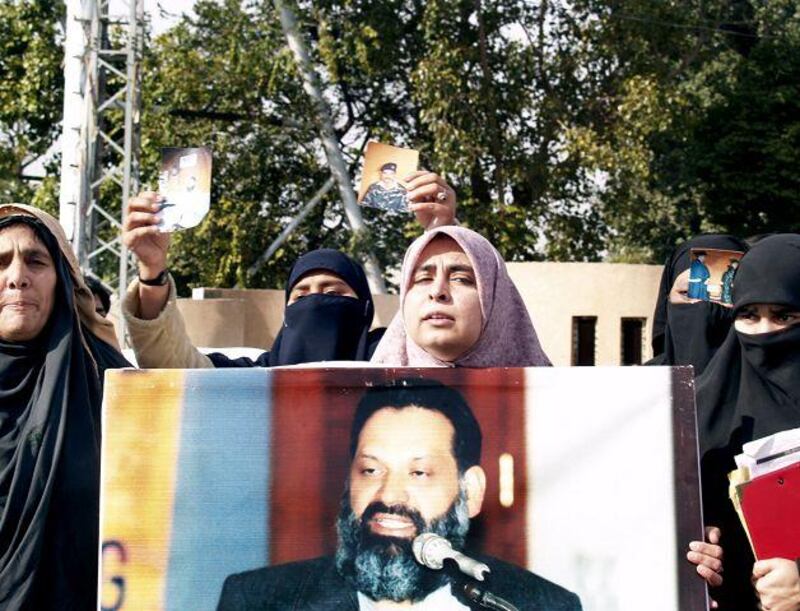ISLAMABAD // Amna Masood Janjua has been trying in vain to locate her husband since he mysteriously disappeared from a bus station in their hometown of Rawalpindi in July 2005. She believes her husband, Masood Ahmed Janjua, 45, a school principal and businessman, is one of the hundreds of people who have been detained without charge by the country's intelligence agencies - and not been seen since - in Pakistan's war on militant organisations.
Together with dozens of families and relatives of the missing, Mrs Janjua, a mother of three, has formed a group called the Defence of Human Rights, which is leading a public awareness campaign about those believed to have been taken by security forces and which has received the support of several other rights groups. A number of members of the group last week camped out on a pavement near the Pakistani parliament for days in protest, waving placards and making their demands over a megaphone.
Opposition political parties have also rallied around Mrs Janjua's campaign and condemned the government of former President Pervez Musharraf. But even after Mr Musharraf was forced out of power last year by a democratically elected government, Mrs Janjua said, no serious effort is underway to find the missing persons. She is exasperated by the "lip service" offered by the current government. "I have been asking the political government to simply locate the missing. We just want to find our loved ones without antagonising anyone," she said.
Pakistani officials during Mr Musharraf's presidency denied that any such disappearances took place but later obliquely acknowledged the practice when interior ministry officials, testifying before the Supreme Court - which had called on them to acknowledge the detentions and deliver the missing - said they were trying to locate those who had disappeared. By 2008, more than 100 individuals had been quietly released although no admission of detainment was made.
Officials today, while failing to make an admission, say the numbers of those missing are far lower than Mrs Janjua and other activists claim. They also maintain that most of the "disappeared" were either involved in terrorism-related activities or maintained links with militant groups. Rights activists believe the country's powerful intelligence agencies run safe houses and secret prisons where the disappeared are detained. Mrs Janjua said the government seems unable to hold the agencies to account for their actions.
After her husband disappeared from a bus terminal in Rawalpindi, she was forced to take over his business and support her children single-handedly. Mrs Janjua claims that according to information gathered by her group, 650 people are still missing in Pakistan. Out of these, 250 are from Baluchistan province while 220 are from Punjab. Rights activists say most of those who are from Baluchistan are not terrorists but nationalists belonging to separatist political parties.
"It's the responsibility of the president and the prime minister to help us," she said. Mrs Janjua said she has held several meetings with Rehman Malik, the country's interior minister, who has given her many assurances without any results. "He keeps moving in circles," she said. The federal government told Mrs Janjua the search for missing persons was the responsibility of provincial authorities, who in turn told her they had no jurisdiction in actions taken by the intelligence agencies.
"Everyone is trying to avoid the blame and do not want to take responsibility," Mrs Janjua said. "There seems to be no effort for a breakthrough." She has experienced similar frustration with the country's parliamentarians, to whom she distributed hundreds of leaflets detailing the issue of the missing persons. Faisal Karim Kundi, the deputy speaker of the National Assembly, to whom Mrs Janjua personally handed a leaflet, later denied in a television interview he had ever met her.
Matters looked more promising in 2007 when the chief justice of the Supreme Court, Iftikhar Muhammad Chaudhry, aggressively pursued the issue, reprimanding the police and intelligence agencies for not following the due course of law in detaining people linked with terrorism or suspected of having links with terrorist organisations and for their lax approach in resolving the current dilemma. However, in the intervening period, first when Mr Chaudhry was sacked and kept under house arrest by Mr Musharraf and then after he was reinstated and saddled with a set of new expectations, the issue of missing persons has not been at the forefront of the chief justice's priorities, a fact Mrs Janjua acknowledges. "The judiciary is expected to perform miracles," she said.
No court hearing has been fixed yet regarding the missing, she said, and the only consolation was the fact that officials of the Supreme Court have been, and are continuously, in touch with the interior ministry and are urging the ministry to prepare an updated list of those missing. As she wound down her group's protest near parliament on Friday evening, Mrs Janjua said she and the other members of her organisation would not give up on getting their relatives released.
"I just want my husband back," she said. "All of us want our loved ones back." smasood@thenational.ae






